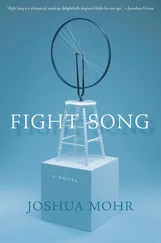He’s eighteen now and can join the military, can go anywhere without needing any consent except his own. He is his destiny and nothing as silly as a broken mouth will stop him.
He stokes these calls to arms, these fantasies with his eyes closed, lounging in bed, imagining distant lands filled with beautiful women who actually like listening to him speak, who think it’s sexy how he takes his time delivering every sound. They don’t get frustrated with him. They don’t badger him.
All these possibilities disappear when a booming knock smacks through his plywood door, these declarations and illusions that had thrived in his solitude now scatter like bugs, once Uncle Felix shakes the meager door with his anger and enthusiasm, saying, “Hey, it’s fish o’clock.”
“No,” Balloon Boy says, and six seconds later adds, “thanks.”
With open eyes and a gruff uncle making too much noise, the reality of Traurig hits him like the heat outside.
Rodney sighs deeply, wipes his eyes. Each day always starts with the same action: looking at the picture on his bedside table, the shot of him and his mom on horseback, taken when he was ten years old, before the thump-splat ouch, before she ran away. The shot is taken head-on: Rodney sitting in front of his mother, all of their faces lined up in a row — horse, boy, mother.
The day she left for good, she tucked this picture under his pillow, and he’s come to think of it as a love letter, a last letter, an explanation, her way of saying she’s sorry and she still cares for him, even in her absence. Yes, sometimes letters don’t have words; sometimes the image tells you everything.
Yet some do have words: There is one other picture that Rodney has from his mom, a postcard. He keeps it tucked between his box spring and mattress. He had received it a few weeks after she left. It’s of the Golden Gate Bridge on a sunny day. On it, his mom has written, “Some day, I will tell you everything.” He likes reading the message, but what he adores examining is the return address, chiseled into his memory. He has no idea if she’s still there but at least it’s a way to start.
More knocking from Felix, the plywood barely standing up to his knuckles.
“You can’t skip, not even on your birthday. I let you sleep in,” says his uncle, “but fish wait for no man.”
“Five,” says Rodney, “more, min, utes.”
“No more minutes. Fish beckon us. They challenge us. There’s a fight to be had, and we will not lose.”
“Oh,” Rodney says, “kay.”
Balloon Boy knows it’s not worth pointing out that there aren’t any fish waiting outside, not even a body of water by their house, doesn’t feel compelled to point out that they’re going to cast their lines in the street. But the facts won’t help him win. Nothing can. Uncle Felix will not accept any excuses, any logic, and so Rodney sighs and rises, bemoaning this beginning to his birthday. It’s not as though he was expecting anyone to deliver an ice cream cake to his room, leave him with a spoon to gulp down the whole thing in peace. It’s not as though his dad and uncle are the kinds of people to barge in his room with a pitch pipe, get that perfect starting note and regale him with a harmonized version of “Happy Birthday” while wearing those little coned hats, blowing into kazoos as the song concluded, but did his first day as an adult have to start with fish o’clock ?
“Today we may catch Moby-Dick,” says Felix, pounding a couple last times before walking away, calling to his nephew while marching down the hall. “Let’s snare the white whale!”
Rodney gets out of bed, stumbles over to his dresser. Damn does he wish for central air conditioning. They do have a swamp cooler, but it only pumps its chilly air into the living room. The bedrooms, mere cinderblock squares, are like jail cells. That’s another reminder of his mom in his room — the way they painted the cinderblock walls like a chessboard, alternating black and white. “Let’s make your room look like Alice in Wonderland,” his mom had said, and they spent a weekend taping each cinderblock off, making sure they did an impeccable job.
Now, though, some of the black paint has peeled off; he’ll find chips of it on his concrete floor, withered by the sun, the flecks looking like dead flies.
Rodney dresses, shorts and a tank top, no shoes, and starts walking toward the front yard, to watch the catch and release of the street fish.
He stops in the front yard, which is only sand and dirt and scrub brush, a little dune in the middle where his dad, Larry, stands, king of his sad hill. Rodney climbs the two-step dune and says, “Hi.”
Larry, clutching a whiskey bottle, says, “How are you?”
How am I? thinks Balloon Boy. I’m a year older. I’m ready to celebrate. Ready to break out.
But what he says is “Fine.”
“You wanna cast after Felix?” asks Larry, pointing at his brother. Uncle Felix is in the middle of the street, like he’s knee deep in a stream, expecting a trout to nibble any second.
“Asphalt practice is better than nothing,” says Uncle Felix, but it’s unclear who he’s talking to.
“Want a plug, son?” says Rodney’s dad, shaking the whiskey bottle.
“No,” he says.
“Not even on your birthday?”
Oh, so he does remember.
“No,” Rodney says again.
“More for me,” his dad says, getting a good buzz on top of his tiny dune.
“And me,” Uncle Felix says, tossing another cast. “Fishermen have an unquenchable thirst.”
Larry admires the cast with a whistle, then says, “Gotta pay our respects to the brass band,” taking an honoring sip.
“Don’t distract me talking about them crazies,” Uncle Felix says. “A fisherman needs to keep his focus. He has to keep his mind submerged under the water trailing all those schools of fish.”
Sara comes speeding up the road, all vengeance and vinegar. From where Larry and Rodney stand, she misses Uncle Felix by a few feet, her car skidding to a stop.
Balloon Boy wants to say something to Sara, ask if she’s okay because she looks distressed. But he thinks better of it. Seeing Sara is hard. Reminds him of all he lost after the thump-splat ouch. They used to be best friends, Sara and Rodney, kissing sweethearts from back in eighth grade. Back before the balloon went up with him as a stowaway. After his accident, Sara stopped coming around much, which makes Rodney wonder if he’s wrong — maybe there’s not two of him, his true self surrounded by a shell of Balloon Boy. No, he might simply be the one the world interacts with, might simply endure a life trapped away from all he loves. It’s like living behind a window that’s been painted shut. No one can hear his true self from the outside. The Shakespeare actor, the MC, the minister, the boy on the horse. Nobody knows that there’s more in him, that there’s honor and the ability to love and thrive. But how can he help strangers see these things when he can’t even talk?
Uncle Felix storms toward Sara’s car, lifting his boot and kicking her side mirror, which goes flying, and he says, “Are you crazy, driving like that?”
Balloon Boy and his dad walk down the dune, across the dirt to the edge of the curb. “Your girlfriend really did it this time,” Larry says, guzzling from the whiskey bottle.
“Be,” Balloon Boy calls to Uncle Felix, knowing the rest of his thought but waiting for his mouth to catch up, “nice.”
“Huh?” his uncle asks.
“Be. Nice.”
“Stay out of this,” says Felix.
The music blares from Sara’s car, a rock and roll song with the singer rapping over the electric guitars. Balloon Boy wants to hear the whole song, wants to soak up the way the rapper deflects all those quick syllables off of one another. That’s what he wants for his birthday: words coming fast and agile from his mouth.
Читать дальше












